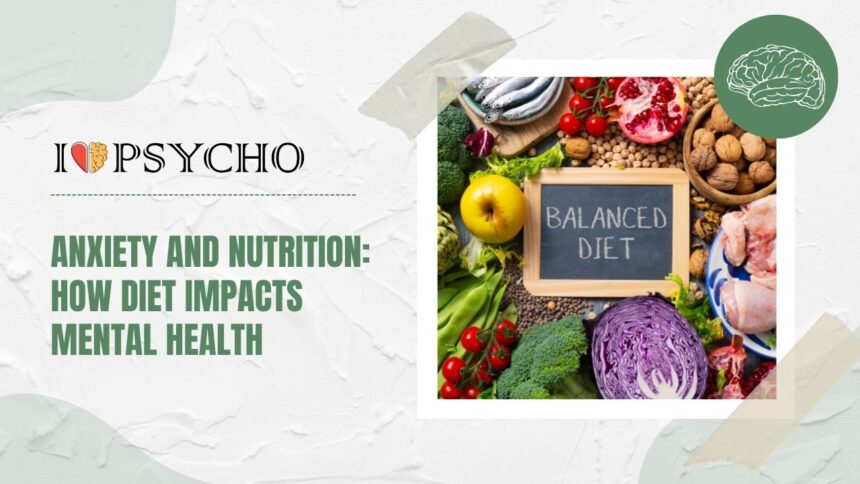Are you feeling overwhelmed by anxiety and seeking ways to nourish your mental well-being? The connection between what we eat and how we feel is undeniable. In this blog post, we’ll explore the impact of nutrition on anxiety levels, discover foods that can either calm or exacerbate our worries, and learn valuable meal planning tips to support a balanced mind. Let’s delve into the world of anxiety and nutrition to pave the way for a healthier, happier you!
The Link Between Diet and Mental Health
Our diet plays a crucial role in influencing our mental health and well-being. Research suggests that certain nutrients can impact brain function and mood regulation. For example, omega-3 fatty acids found in fish like salmon have been linked to reduced anxiety levels. Conversely, diets high in processed foods, sugar, and unhealthy fats may contribute to increased feelings of stress and anxiety.
Moreover, the gut-brain connection highlights how our digestive system communicates with the brain through neurotransmitters. A healthy gut microbiome nurtured by a diverse range of fruits, vegetables, whole grains, and probiotic-rich foods can support better mental health outcomes. By fueling our bodies with nutrient-dense foods packed with vitamins and minerals, we provide the essential building blocks for optimal brain function and emotional stability.
Incorporating mindful eating habits can also enhance our relationship with food and promote greater awareness of how different foods affect our mood. By recognizing the profound link between diet choices and mental well-being, we empower ourselves to make informed decisions that nurture both body and mind alike.
Foods That Can Help Reduce Anxiety
Are you looking for natural ways to manage your anxiety? The food you eat can play a significant role in how you feel mentally and emotionally. Incorporating certain foods into your diet can help reduce anxiety symptoms and promote overall well-being.
First up, let’s talk about the power of complex carbohydrates. Foods like whole grains, sweet potatoes, and legumes can have a calming effect on the brain by stabilizing blood sugar levels. This can help regulate mood and reduce feelings of stress and anxiety.
Next, don’t underestimate the importance of incorporating omega-3 fatty acids into your meals. Sources like salmon, chia seeds, and walnuts are known for their anti-inflammatory properties that support brain health. These healthy fats can positively impact neurotransmitter function and mood regulation.
Additionally, including foods rich in magnesium such as spinach, almonds, and avocado can also be beneficial for managing anxiety. Magnesium plays a key role in regulating neurotransmitters involved in mood stability.
Incorporating these nutrient-dense foods into your daily meals can contribute to a more balanced mental state and help alleviate symptoms of anxiety over time.
Foods That Can Worsen Anxiety
When it comes to managing anxiety, the foods we consume play a crucial role in either alleviating or exacerbating our symptoms. Certain foods have been linked to worsening anxiety levels and should be consumed in moderation.
One of the main culprits is caffeine – found in coffee, tea, and energy drinks. While it may provide an instant boost, excessive consumption can lead to increased heart rate and feelings of restlessness, triggering anxiety.
Highly processed and sugary foods are also known to negatively impact mental health. Foods like candy, pastries, and sugary beverages can cause blood sugar spikes followed by crashes, leading to mood swings and heightened feelings of anxiety.
Additionally, consuming high amounts of alcohol can disrupt neurotransmitter levels in the brain, potentially intensifying feelings of worry and unease.
It’s important to be mindful of these food choices and their potential effects on your mental well-being. Making small adjustments to your diet can make a big difference in managing anxiety levels effectively.
The Importance of a Balanced Diet for Mental Health
Maintaining a balanced diet is crucial for supporting your mental health. The foods you eat play a significant role in influencing your mood, energy levels, and overall well-being. A diet rich in fruits, vegetables, whole grains, lean proteins, and healthy fats can provide essential nutrients that support brain function and help regulate neurotransmitters responsible for mood.
On the other hand, consuming excessive amounts of processed foods high in sugar, saturated fats, and artificial additives may contribute to inflammation in the body and negatively impact mental health. These types of foods can lead to spikes and crashes in blood sugar levels, affecting your mood stability.
By prioritizing a balanced diet filled with nutrient-dense foods, you are not only nourishing your body but also providing it with the necessary components to support optimal cognitive function and emotional regulation. Remember that what you eat has a direct impact on how you feel both physically and mentally.
Meal Planning Tips for Managing Anxiety
When it comes to managing anxiety through meal planning, consistency is key. Aim for balanced meals that include a variety of nutrient-rich foods like fruits, vegetables, whole grains, lean proteins, and healthy fats.
Plan your meals ahead of time to reduce decision-making stress. This can help you stick to a routine and avoid impulsive food choices that may worsen anxiety symptoms.
Include foods rich in omega-3 fatty acids like salmon, walnuts, and flaxseeds which have been linked to reducing anxiety levels. Avoid skipping meals as low blood sugar can trigger feelings of anxiousness.
Incorporate mindfulness into your eating habits by focusing on the flavors and textures of your food. Take time to savor each bite without distractions from screens or work obligations.
Stay hydrated throughout the day as dehydration can exacerbate feelings of stress and anxiety. Consider keeping a food journal to track how different foods impact your mood and energy levels.
Other Lifestyle Factors to Consider
Aside from diet, other lifestyle factors can also play a significant role in managing anxiety. Regular exercise has been shown to reduce symptoms of anxiety by promoting the release of endorphins, which are known as “feel-good” hormones. Getting enough quality sleep is crucial for mental health as lack of sleep can exacerbate feelings of anxiety and stress.
Incorporating relaxation techniques such as meditation, deep breathing exercises, or yoga into your daily routine can help calm the mind and lower stress levels. Limiting caffeine intake is important since excessive consumption can trigger or worsen anxiety symptoms in some individuals.
Maintaining social connections and seeking support from friends and family members can provide emotional reassurance during challenging times. Setting boundaries with work commitments and making time for hobbies or activities that bring joy and relaxation are essential for overall well-being.
Finding a healthy balance between work, relationships, self-care, and leisure activities is key to managing anxiety effectively on a day-to-day basis.
Seeking Professional Help for Mental Health and Nutrition Support
When dealing with anxiety and seeking to improve mental health through nutrition, it’s essential to consider the benefits of professional support. A trained therapist or counselor can provide valuable tools and coping strategies to manage anxiety effectively. Additionally, consulting with a registered dietitian can help create a personalized meal plan tailored to your specific needs and goals.
These professionals can offer guidance on incorporating foods that promote mental well-being while avoiding those that may exacerbate anxiety symptoms. They can also address any underlying issues related to food and body image that may contribute to feelings of stress or anxiety.
By working with experts in both mental health and nutrition, you can develop a holistic approach to improving your overall well-being. Remember, it’s okay to seek help when needed – taking proactive steps towards better mental health is a sign of strength and self-care.
Conclusion
It is clear that there is a strong connection between diet and mental health, particularly when it comes to anxiety. By incorporating foods that support brain function and mood regulation while avoiding those that can exacerbate feelings of anxiety, individuals can better manage their symptoms. Remember, maintaining a balanced diet along with other lifestyle factors like exercise and stress management is key to promoting overall mental well-being. And always remember, seeking professional help when needed for both mental health and nutrition support is crucial in navigating the journey towards improved mental wellness.







